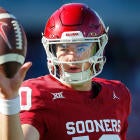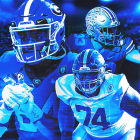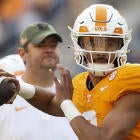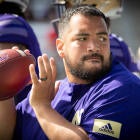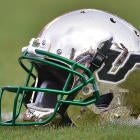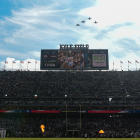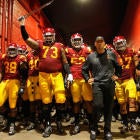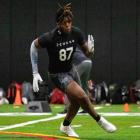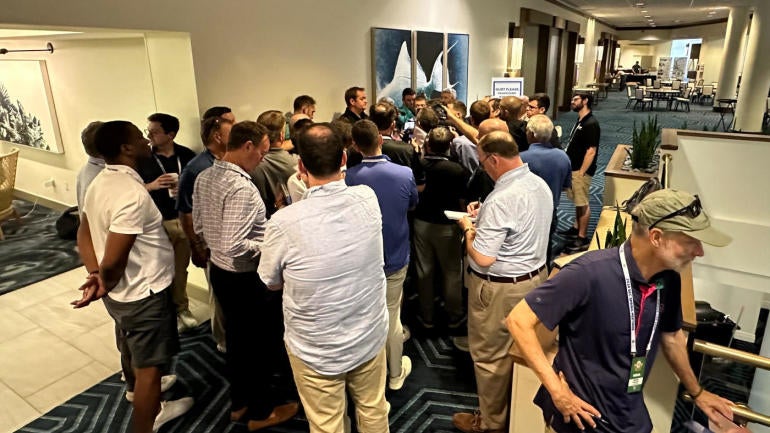
DESTIN, Fla. -- In a scene straight out of "The Godfather," the SEC's highest-paid coaches came one-by-one to pay their respects.
Steve Sarkisian. Lane Kiffin. Hugh Freeze. Kalen DeBoer.
Billy Napier, fresh off talking about the Jaden Rashada lawsuit with reporters, and Kirby Smart, Rashada's new coach, amicably chatted together with him for more than 10 minutes.
At the posh Hilton Sandestin Beach Golf Resort & Spa, the most interesting thing that happened during the SEC's annual spring meetings was watching Creative Artists Agency superagent Jimmy Sexton operate out of an off-lobby restaurant that hawked $23 "gourmet" burgers. Sexton largely keeps a low profile in public, but he was impossible to miss this week as college football's bold-faced names orbited around him.
For a few hours on Tuesday, Sexton, flanked by his CAA team, had a near-constant receiving line of multi-millionaires eager to catch up and pick his brain. It was like watching a maestro as Sexton defly moved from client to client, always seeming to time it perfectly and never leaving a coach feeling like he ditched him for one of his bigger clients.
In a week defined by unknowns, it showed the one certainty was the power Sexton holds within college football. Of the SEC's 16 head coaches, Sexton represents 13.
***
The week at one of Florida's prettiest beaches may have set a record for the most "We'll see" answers deployed in one place. Reporters and athletic directors alike had the same questions following the landmark $2.8 billion House settlement that has been agreed upon but not finalized yet.
What does it mean for Title IX? What will the payouts be for athletes in a new revenue sharing model? What will it mean for athletic departments as a whole that now have to find a way to pay for an additional $22 million a year?
There were theories but no definitive answers yet.
"No consensus in anything right now," Tennessee head coach Josh Heupel said. "From your presidents to your athletic directors to us, too. Hopefully we'll be able to find a really good landing spot."
Those answers should be coming in the next few months as the plaintiff attorneys are expected to submit the long form House agreement to Judge Claudia Wilken by July, according to CBS Sports' Dennis Dodd. With that should come additional clarity and understanding, particularly in how the plaintiffs structure the back damages payments for the impacted athletes from 2016-2020.
But until then, it was educated guesses, at best, on what college athletics' new model will look like moving forward. Thus, the most noteworthy comments landed more on the periphery of what's happening rather than getting into the nitty gritty details of the House settlement that can make even the most diligent observer's eyes glaze over.
There was Florida athletic director Scott Stricklin spilling the beans on the expectation the NCAA will allow sponsored field logos, a potentially lucrative new revenue spigot for athletic departments. If we don't get a Buc-ee's logo within Texas A&M's Kyle Field, we've all been deprived.
Stricklin also weighed in on the idea of Florida State joining the SEC, his support for Napier amidst the Rashada lawsuit and a litany of other topics in what had to be a record-long media session with reporters that stretched upwards of an hour. For as much outside noise as there is about Stricklin's and Napier's long-term job security, the Florida athletic director answered every question as calmly and collected as one could.
We had Texas athletic director Chris Del Conte fire off an early hot take on The Paul Finebaum Show, declaring there was nothing in the SEC like the Red River Rivalry game. "It's the greatest thing ever," Del Conte said. He's wrong, obviously – the Iron Bowl, Egg Bowl and World's Largest Outdoor Cocktail Party all have arguments for being better, for starters – but it was fun to see the Texas athletic director already start to flex his muscles. Del Conte has made a name for himself as an outspoken, aggressive AD who is perfect for Texas and will have his voice heard within the SEC as the Longhorns officially join the conference in July.
New Texas A&M athletic director Trev Alberts was equally candid -- there must be something in the Texas water -- when he reiterated that college athletics has an expenses problem, not a revenue problem. It was refreshing to hear a college administrator admit as much when grappling with the changing environment, and, yes, Daniel Libit, we are aware he didn't invent the turn of phrase.
An increasingly spicy Greg Sankey came out when discussing his issues with the NCAA and what led him to create a joint advisory group with Big Ten commissioner Tony Petitti. For a long time, it seemed Sankey wanted to be the good guy and play nice with everyone, even to his own frustration, in order to not rock the boat. Now, a confident Sankey is going to do what he believes is best for his conference even if it means "sometimes you have to be a jerk."
The coaching ranks missed the presence of former Alabama head coach Nick Saban, who always arrived in Destin with talking points and some overarching topic he wanted to use his bully pulpit to address. Watching new head coach Kalen DeBoer linger and make small-talk with reporters was a stark contrast from the fastidious Saban who rushed from meeting to meeting, usually with a cellphone glued to his ear along the way.
Georgia head coach Kirby Smart is the new leading voice in the coaches room, according to Lane Kiffin, but he hasn't been as interested in using that voice with the media. Kiffin, when he wants to, has that same ability to address the big picture topics in a salient manner but doesn't have the same gravitas yet. In the first year without Saban, SEC's spring meetings felt different without him.
"It's different, certainly for myself coming all these years and seeing him," Kentucky head coach Mark Stoops said. "I've known Coach (Saban) personally a long time, and then working with him as a colleague, you miss him."
***
Quite often, I get asked what my job's like. I love reporting and writing about college sports and am lucky to do so. But if your eyes are green with envy at the idea of reporters spending a week on the beach getting a tan and drinking Piña Coladas, think again. The event, in particular, is mostly windowless conference rooms and stalking the SEC's glitzy multitude of millionaires in hallways for nine hours a day..
Rivaling Sexton's lobby reception was the steady stream of SEC heavy-hitters eager to be on Paul Finebaum's show this week. Alas, the Finebaum set was the closest many of us got to the beach.








